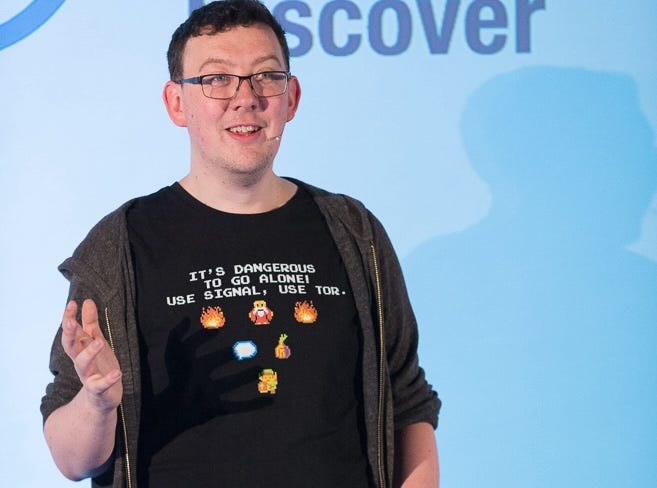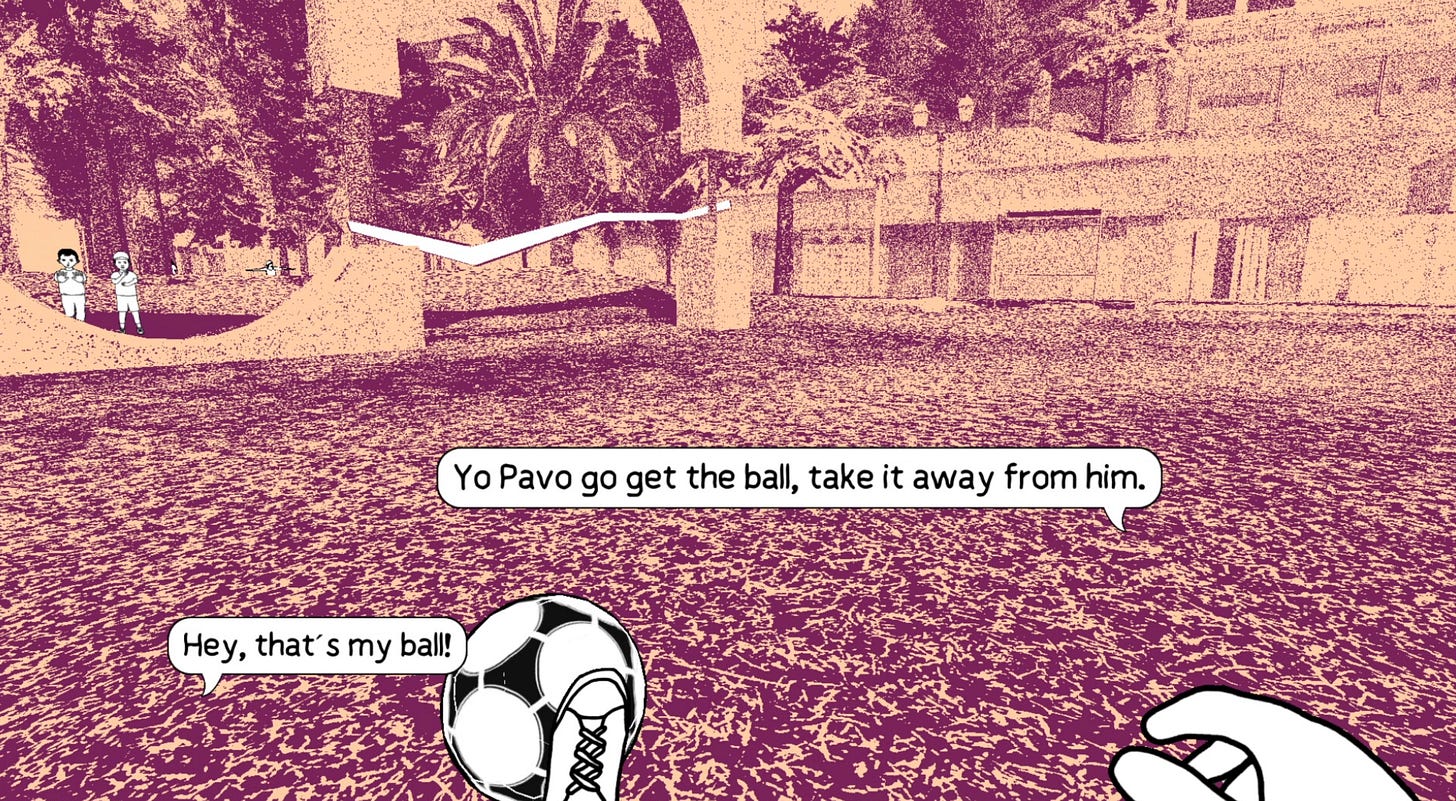From 4chan to the White House, 01/05/2025
James Ball explains how failing to take games seriously has fed the populist right
Award-winning writer James Ball explains how not taking games seriously helped feed the populist right
Apple ordered to stop collecting fees on external app stores by a US judge
Despelote’s football charms catch the eye in the week’s releases
| Find me on Linkedin | Follow me on Bluesky | Wishlist my book | Email me |
Hello VGIM-ers,
Guess what? I’m finally ready to whip the covers off the next Video Games Industry Memo event.
The VGIM Business Breakfast, sponsored by Games Press, is returning to Brighton on Wednesday 9th July. And you’re invited to come along.
The breakfast, which will run from 8:30 am to 10:00 am, will take place at Loading Bar along the city’s beautiful seafront.
It’ll feature a panel about the past, present and future of video games media, with our special guests set to be announced at the start of June.
And most importantly of all, it will feature the delights of a free breakfast pastries AND hot drinks to prep you for a busy day at Develop: Brighton, the UK’s biggest games business conference.
We have a hard limit on places at breakfast because rooms are only as big as they actually are. So if you want to join us, you’re going to have to be quick.
Get your free place at the VGIM Business Breakfast in Brighton here.
And with that done, let’s get on with the Big Read.
The big read - From 4chan to the White House
Big question: Why have alienated young men, especially in America, found their home in the populist political right? Part of the answer is that the populist right takes video games seriously.
Mind the gap: Games have typically been treated as a bit of a joke by wider society. Long-held stereotypes about games being worthless, provoking violence or turning players into addicts has created a gap between the experience of the millions who play games and the perception of the medium in wider society.
The art of persuasion: For most of us who love games, our way of dealing with this problem has been to try to change minds. We’ve talked about games as an economic powerhouse. We’ve argued that games have cultural power. And we’ve sought to support research that’s provided a level-headed perspective on whether games make people aggressive (they don’t) or if they negatively affect mental health (again, a pretty firm nope).
Tunnelling down: But others reacted differently. A small number of ‘always online’ ‘transgressive’ young men, especially in America, have seen the rejection of games in liberal democratic culture as part of a wider betrayal of their personal and political identity.
Worrying development: And according to James Ball, Political Editor at The New European and author of The Other Pandemic: How QAnon Contaminated the World, those disaffected people have successfully been courted by the populist right and authoritarian governments - fuelling their causes with activism and energy that is helping dismantle the liberal order.
Teen culture perverted
History lesson: James does not fit the profile of someone who has concerns about video game communities. “I obsessively play video games,” he said when I caught up with him via video call last month. “My Dad had a Sinclair QL, so I could type before I could write. We used to put mine and my stepbrother’s names into an early text-only version of Championship Manager.” James has since put “three and a bit months of playtime” into a World of Warcraft character. He also guessed that he’s on a seventh playthrough of Baldur’s Gate 3, suggesting he is well into his games.
Industry talking points: And when I asked him why he loves them, his answers were dangerously close to the talking points I used to brief when I headed up comms at the games trade association for the UK. “It’s immersive,” he said. “You get very deep and interesting narratives. You have agency, which is very nice in a world where we often don’t.”
Social security: And though he now mostly plays single-player games, he “used to like the social element” of video games because it gave him a sense of community he couldn’t find elsewhere when he was younger. “I was a teenager and I didn’t have many friends, so I was a lot better at making them on the Internet,” he explained matter-of-factly.
Gilded connection: James found connection and camaraderie in his World of Warcraft guild, where teaming up with other players to go on raids was “weirdly quite wholesome and nice.” But in the early 2000s, he also found his way into an online forum obsessed with games and games culture: 4chan.
Noisy fans: According to James, the chaos, irreverence and anarchy of 4chan is shaped by its predominantly teenage male user base. And naturally, that means that most of them play games and have been mocked for it. “I think the most vocal core of video games culture is teenage boys and young men. It’s perhaps the only cultural medium they dominate, and it’s perhaps the most vilified medium,” he says.
Adopting a posture: This explains why 4chan’s culture was, and has remained, steeped in games references. Early campaigning activity on the board included messing around in Habbo Hotel by getting members of the community to dress up in suits and block off access to the virtual pool. The word ‘kek’ replaced ‘lol’ in the forums not because it was the shady far-right signifier it is viewed as today, but because it’s what people who play as Alliance characters in World of Warcraft see when someone playing as a Horde character types "lol" in the in-game chat.
Ill-spent youth: The early years of the chan boards were undoubtedly afflicted by the problems we see today, such as the casual throwing around of slurs for the sake of being transgressive. But James argues that most people in places like 4chan came to engage in some teenage bad behaviour before growing out of it. “You know [talking about] a path like mine, you get very obsessively into gaming and online communities,” he said. “Some of them are a bit dark. Some of them are a bit dodgy. And then the real world kicks in and you migrate out of them.”
In too deep: The problem is that not everybody left those spaces. “You get the people in the book who I talk about who are left behind and who don’t find that life starts for them,” he explained. “The more people you have left behind, the more they toxify the communities and the more dangerous they get.” This results in disaffected people, usually men, bringing bitterness and resentment into their communities. This transforms places which were previously tastelessly naughty into spaces where harm happens, hurting the people within and running the risk of creating an overspill which affects society at large.
Incredulous: And it is in these spaces where the wider world’s failure to take games seriously is seen as another reason for these disaffected men to disengage. “I think there’s an odd thing about gaming where there is a resentment that it’s not taken seriously”, James said. Outlets that publish what James calls “incredulous stuff” about games causing violence, brainwashing players or creating mental health problems end up making the problem worse by actively pushing players away from them.
Culture wars: “I think there’s a sufficient level of irritation or fury that you end up with these clashes of culture that push people down the extreme versions of the path,” James explained. “You get so annoyed at what you’re hearing that you start getting disillusioned with the mainstream culture that says that.”
A worrying mix: And as his excellent book explains, this is a part of why the chan boards became a breeding ground for QAnon. Its audience of disaffected young men spent more time talking to themselves in toxic language. The ‘have-a-go’ spirit of hacking culture was applied to answering cultural questions. And the playfulness of role-playing games encouraged people in these groups to exercise agency by adopting roles, such as acting as ‘detectives’ on scandals.
Damaging the truth: The result was the generation, spread and ‘prosecution’ of conspiracy theories that emerged from this space and would go on to damage truth across society. This included the emergence of Gamergate in 2014, which blended the toxicity of the community with the culture they were immersed in to create a non-existent scandal.
Political opportunism: “It was the coalescing of a new sort of young male political anger and political force,” said James. Gamergate helped create the conditions, the models for activism and the activist base which would feed the alt-right and QAnon. These groups would, in turn, form the activist base and information space, which would help bring the populist right to power in America.
Opening up the chat
Listening exercise: But Gamergate would not have had this influence if it hadn’t been listened to. And it was right-wing populists in America who realised that ‘listening’ to this community could translate into influence in both game communities and wider politics: opening the door to power in the process.
Important context: Steve Bannon spotted the opportunity in these game-adjacent communities as early as the mid-2000s, identifying that angry, but socially powerful, online communities had a role in building his movement. Breitbart, the far-right publication that Bannon founded with Andrew Breitbart around the premise ‘politics is downstream from culture’, brought Gamergate into the mainstream political discourse to open the ‘culture wars’ and bring that community of online activists to their side. And over the past decade, that relationship has solidified to the extent that both Donald Trump and Elon Musk publicly courted games communities during, and after, the 2024 US election.
Flattened culture: But why has the populist right’s engagement with games culture helped it shape our wider political narrative? The answer is that social media has ‘flattened’ our access to information. This has reduced trust in institutions which don’t speak clearly to us or adopt our culture, while increasing trust in individuals and communities that do. “People used to want communications with authority, and now they want them with authenticity. People want to feel like they’re in a conversation with an equal, that they’re hearing the actual view of the person speaking,” he said.
Person to person: “So the Republicans have an infrastructure that understands people and how they operate. That fits into gaming culture. But it fits into almost any bit of culture where if you communicate as a human, if you act like a human and come across that way, you get rewarded. The right is better at doing that, and so it connects better with this group that values games even more effectively than the general population.”
Channelling influence: This leads to a few interesting outcomes. In the US, the populist right has turned its affinity for games into an information war advantage online. The activist base which turned to Donald Trump has given right-wing views a big advantage in games adjacent social media spaces, with content creators and communities on YouTube, Twitch, X and Discord loudly promoting their worldview beyond the confines of games themselves.
Institutional bias: The populist right’s dominance of the space is strengthened further by the fact that the powers behind liberal democratic politics don’t see the value of properly engaging in these spaces. “The Democrats have people who can game like AOC (Alexandra Osorio Cortez, a member of the House of Representatives who streamed Among Us to an audience of 400,000 in the run-up to the 2020 election), but the institutions behind them seem to regard that as an aberration or a bad thing,” he explained.
Unintended consequences: As a result, liberal democracy cedes the field to the populist right. And in doing so, it further opens up the space to other authoritarians who can use their genuine interest in video games as a way to connect with audiences they shouldn’t otherwise reach.
Unlimited money cheat: “The thing with Mohammed bin Salman [and his interest in games] is insanely funny, but it also makes him relatable. If you woke up tomorrow and were the dictator of an incredibly rich country that had huge money and power, would you not use it to fuck around with your favourite games?,” James pondered. “It turns someone who should be this remote awful figure…into someone who can actually look more convincingly like a human being than quite a lot of establishment Democrats.” As James put it, it results in a lot of people thinking “it doesn’t mean I like the fucker, but I get him” - making him look more human as a result.
A paradox: And that is the crux of the matter. By continuing to treat games as one of the lesser meats of the cultural buffet, liberal figures leave room for someone else to fill their plate up with the benefits of engaging with its communities instead. This has allowed people who seem like the antithesis of fun to define themselves through the power of play - winning powerful, but problematic, digital activists to their side in the process.
Gaming a solution
Fight the right battles: So, what can be done about this? It’s hard, if not impossible, to bring the people who’ve plumbed the depths of QAnon conspiracy theories back to the surface. But some things can be done to bridge the gap to ensure that the millions who play aren’t represented by those on the fringes.
Due prominence: According to James, the first step for liberal society to win the war in games is to simply cover it better within mainstream media and culture. “When your culture or recreational pursuit isn’t there [covered in an outlet], why would you go there? You’ve got 12 pages of sports coverage every day, 10 pages of TV and film coverage and nothing on gaming,” James said. “There’s a mutual anathema where a lot of mainstream culture doesn’t want to like games, acknowledge they’re interesting, doesn’t want to cover them or take them seriously and then goes ‘why do those guys hate us?’ Everything mainstream culture does says ‘fuck you to gamers’ and then writes up with outrage that they get a fuck you back.” Breaking this cycle of dislike is important for bringing play into the cultural mainstream.
Musking it up as he goes along: Next, it is possible to weaken the hold of populist leaders in games spaces by showing that a lot of their interest is inauthentic or forced. Players who caught Elon Musk cheating at Path of Exile 2 offer a prime example of how to do this. “He desperately wants gamers to think he’s a gamer and desperately wants them to like him,” James said. “And actually, one of the things he’s missed is the earnestness of that. That’s lethal. The sincere need to be liked is utter poison to that particular community, and he clearly doesn’t gain from it.”
Picking your moment: And finally, James suggests that liberal politics needs to be less heavy-handed with its efforts to influence people when they’re actually in games. “We’re in these liminal third spaces to piss about. We don’t want to be considering relative cultural privilege or whether the dynamics of killing demons in Diablo is loaded with racial semiotics. No, I click and the demon goes pop. That’s fun, this is like being in the pub. And they [the populist right] have at least managed to understand the need to kick back, have fun and not always be on.”
Games are fun: This isn’t to “dismiss the issues” around representation in games or deny the issues raised in this piece, according to James. Instead, it’s about recognising a truth that we all know, that we all believe, but that has been perverted by those who fell most deeply into toxic isolated communities. As James put it to me when we rounded off our call, “games are fun.”
Protecting play: By recognising that and showing how liberal values like freedom, fairness and equity are important for making play fun for everyone, there’s a chance we can begin to shift the politics of play away from the populist right.
News in brief
Rotten Apple: A US Judge has ruled that Apple can no longer impose a commission or fee on any purchase made outside of an app on its platform or put restrictions on how companies encourage users to engage with a third-party site. In a landmark ruling in its ongoing case against Epic Games, Yvonne Gonzalez Rogers also referred Apple to the US Attorney for ‘wilfully’ failing to comply with a previous ruling in 2021. Epic Games has announced that it intends to bring its mobile store to iOS in the US next week as a result of the ruling.
Out of controllers: The UK government has banned the export of video game controllers to Russia to try to deprive it of the tools it uses to fly its drones. Politico reported that Stephen Doughty, the Minister responsible for sanctions in the Foreign, Commonwealth and Development Office, went a little off message when he claimed that “gaming consoles will no longer be repurposed to kill in Ukraine.” But given that Russia does use controllers within its drone force and the EU announced similar measures, it’s a welcome development nevertheless.
Lesta than ideal: And to underline the point about why it’s important to pick the right side in an ongoing conflict, Russia has seized the assets of Lesta Studios on the basis that its former owner has interests in Ukraine. Wargaming, which previously owned the business, disposed of its assets in Russia and Belarus in 2022 as part of a ‘strategic exit’. But a local prosecutor has accused the owners of Lesta Studios and Wargaming of engaging in “extremist activity”, highlighting Wargaming’s fundraising efforts and footage of Ukrainian soldiers enjoying World of Tanks to underscore the point. Hmm.
Not quite cheat codes: Ofcom has published its latest codes of practice for keeping kids safe online that businesses who run any form of user-to-user communication (yes, that means games companies) will need to follow to comply with the Online Safety Act. Businesses will need to see how they measure up against 40 practical measures, such as whether they have a content moderation system and how they train moderators to tackle harm, as well as a series of principles such as offering effective age checks. Companies have until 24th July to get ready, after which Ofcom will be able to wield powers to fine businesses up to 10% of their global turnover. Best get your lawyers looking at this, I’d say.
There will almost certainly be Troubles ahead: Finally, a Northern Irish game developer has defended his decision to make a game set during the Troubles. Northern Ireland ‘74, created by one-man band Johan Nagel, puts players in the shoes of British security forces aiming to recruit informers, deploy troops and run special forces operations to “win hearts and minds” in the country. Given all the noise about Belfast rap group Kneecap over the past few weeks, I’m sure this game won’t prove at all controversial. Coughs.
Moving on
Paul Colls has been hired as Game Director at Meta-owned Beat Games…Omar Elassar has been appointed as Managing Director and Head of Global Strategic Partnerships in Animoca Brands’ new Dubai office…Dorothee Bär has been appointed as the head of Germany’s new Federal Ministry of Research, Technology and Astronautics, making her the country’s ‘Games Minister’...Simon Zhu has ended his time as NetEase’s President for Global Investments and Partnerships. He’ll be replaced by Ken Li, formerly VP of Corporate Development…And because I missed this last week due to it happening after I’d finished the newsletter, Jason Citron has stepped down as Discord CEO. Former Activision Blizzard VP Humam Sahnini is now at the helm…
Jobs ahoy
Auroch Digital is hiring for a Business Development Director…Reddit is looking for a Creative Strategist - Gaming in the States…Sky is looking for a new Head of Gaming…ScreenSkills is hunting for some new Trustees to pad out its board…And is anyone ever going to fill the Rockstar post as Director of Territory Communications?...
Events and conferences
A.MAZE, Berlin - 14th-17th May
Digital Dragons, Kraków - 18th-20th May
Nordic Game, Malmö - 20th-23rd May
Unreal Fest, Orlando - 2nd-5th June
Summer Game Fest, Los Angeles - 6th June
Games of the week
Despelote - Charming narrative football adventure set in Quito, Ecuador scores on PlayStation, Xbox and PC.
Forza Horizon 5 - Open world driving game set in Mexico skids its way onto PlayStation 5.
Moto GP 25 - Latest entry in motorbike racing series arrives across every platform you could possibly think of.
Before you go…
Why is the remake of Elder Scrolls IV: Oblivion great? According to Jamal Michel of the New York Times, the answer is its reassuring jankiness.
In his piece for the NYT, Jamal argues that the re-release’s decision to maintain many of the game-changing bugs that made Oblivion so memorable (and memeable) preserves the character of the original.






